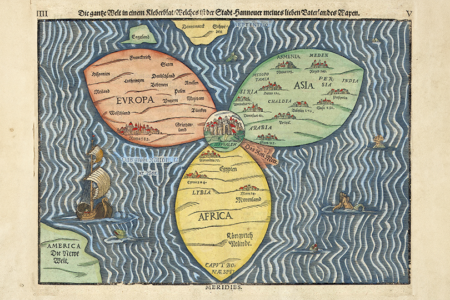Seven Minutes with The International Director Jun/Jul 1978
The New Testament opens with a declaration, “The book of the genealogy of Jesus Christ, the son of David, the son of Abraham” (Matt. 1:1).
To the Jew of the first century, these words were saturated with great significance. For the Christian of the twentieth century, far removed from the historical context, it is often read over quickly as part of a cumbersome and boring genealogy. In reality, Matthew 1:1 is among the most important verses in all the Word of God. As early as the third chapter of Genesis, God had promised a Redeemer – One who would recapture man’s lost destiny as King of the earth and make it possible for him to be restored to the image of God.
Everything in the Old Testament was related to the advent of this Redeemer; everything was moving toward that moment – and now Matthew records that He has walked onto the stage of human history. As a descendant of David, He was born King of the Jews; as a descendant of Abraham, He was heir to the land of promise.
His name was Jesus, coming from the Hebrew “Yeshua”, and meaning Saviour. The name was intended to convey His work, so that when the angelic messenger visited Joseph, he said, “. . . thou shall call his name Jesus; for he shall save his people from their sins” (Matt. 1:21). That is, call Him Saviour (Jesus), because He will save.
He was given no last name. Christ is not really a name, it is a title or position, much like king, or president, or prime minister. The designation “Christ” is the Greek equivalent of the Hebrew “Messiah.” It simply means “anointed” or “the Anointed One”. Of all the titles the eternal God could have given to His “beloved Son”, why does He single out the designation “the Anointed One”?
Three Offices United
In the Old Testament economy there were three divinely appointed positions: the offices of prophet, priest and king. The prophet was God’s spokesman to the people, the priest was the people’s representative to God, and the king was God’s vice-regent for civil matters over the nation. In those three offices, every need of the human heart could be met. To the question, “Is there a word from God?”, the response given would be, “Yes, heed the words of the prophet.” To the inquiry, “Can I ever know and be accepted by God?”, again the answer is “Yes, through the priest.” “But what of justice, righteousness and equity – will they ever become a reality in the earth?”, to which the informed respondent would say, “Certainly, through the king.”
No one man in the commonwealth of Israel ever had all three offices. Moses came closest. He functioned as a prophet, proclaiming God’s word to the Jewish people enslaved in Egypt. He functioned as a priest, so that when God talked of destroying the people because of their sin, he intervened and said, “Yet now, if thou wilt forgive their sin -; and if not, blot me, I pray thee, out of thy book which thou hast written” (Ex. 32:32). He functioned as king, ruling over Israel during her forty year wilderness wanderings. But he did not, in actuality, hold the offices of prophet, priest and king.
It was customary for Israel to consecrate her priests and kings into their respective offices by placing oil upon their heads (cf. Aaron, Ex. 30:30; Saul, I Sam. 10:1; David, 1 Sam. 16:13). Even in the case of Elisha the prophet, God commanded Elijah to anoint him for his prophetic ministry (1 Kings 19:16).
In Jesus, all three of the offices of the Old Testament merged. He alone is prophet, priest and king – and in Him, every need of the human heart can be fully and eternally met. Anointing with oil was symbolic of being set apart and endorsed by God with power for a special ministry. In that light, the words of the Lord are filled to overflowing with meaning: “The Spirit of the Lord is upon me, because he hath anointed me to preach the gospel to the poor; he hath sent me to heal the brokenhearted, to preach deliverance to the captives, and recovering of sight to the blind, to set at liberty them that are bruised” (Luke 4:18).
The writer to the Hebrews clearly differentiated between the offices of Jesus. He wrote, “God . . . hath in these last days spoken unto us by his Son [prophet], whom he hath appointed heir of all things [king], . . . Who . . . when he had by himself purged our sins [priest], sat down . . .” (Heb. 1:1-3). Old Testament priests never sat down because their work was never done. It is precisely because these three offices do merge in Jesus that the same chapter of Scripture records a conversation between the Father and Son: “God, even thy God, hath anointed thee with the oil of gladness above thy fellows” (Heb. 1:9b). Others were anointed; He infinitely more.
Three Appearances Of Christ
In the ninth chapter of Hebrews, three appearances of Christ are mentioned; two appearances are on the earth, and the other in heaven.
The word “appear” or phrase “hath he appeared” occurs in verses 24, 26 and 28, and fascinatingly, all three words in the Greek text are different. Each word means appear, but with a slightly different emphasis or meaning. Unfortunately, the English language does not have a corresponding word and must, therefore, translate all three words appear.
Prophet
In verse 26, the word appear means to “manifest”. It was used outside the Bible of the sun coming over the horizon. The sun was there before it could be seen, but at a certain moment it came over the horizon and men could see it, and the sun was said to appear. The word was similarly used of a company of soldiers waiting in ambush for an advancing enemy force. When the enemy came into range, the hiding soldiers came out of concealment – they appeared. In the case of the sun and soldiers, they were there – but could not be seen until they appeared or manifested themselves.
This is precisely the word the New Testament writer uses to refer to Christ’s first appearance. He was the eternal, pre-incarnate Son of God, but at a precise moment in history, He came across the horizon and was born in the village of Bethlehem – He appeared, though His “. . . goings forth have been from of old, from everlasting” (Micah 5:2).
But why did He appear the first time? Hear the inspired penman: “. . . But now once, in the end of the ages [Church Age], hath he appeared to put away sin by the sacrifice of himself” (Heb. 9:26).
During the Lord’s first appearance, He functioned as a prophet. He thundered, “. . . He that hath seen me hath seen the Father” (John 14:9b). And again, “. . . I am the way, the truth and the life; no man cometh unto the Father, but by me” (John 14:6). And again, “He that believeth on the Son hath everlasting life; and he that believeth not the Son shall not see life, but the wrath of God abideth on him” (John 3:36). He was God’s spokesman to the people.
Priest
The word translated appear in verse 24 was used to describe a man who, on behalf of another, went into the presence of a king or magistrate. It was a legal term, much like the English word “advocate” or “lawyer”.
For Christ is not entered into the holy places made with hands, which are the figures of the true, but into the heaven itself, now to appear in the presence of God for us (Heb. 9:24).
What the writer is saying is that Christ has not entered the tabernacle, which was an illustration or shadow of the heavenly throne, but into the actual throne room and presence of God himself to appear in an official capacity as a Priest for every blood-bought child of His. The believer’s security rests, not on his works, but on the present priestly ministry of Christ. Every time that Satan accuses, the High Priest steps up and says, in effect, “But Father, I shed my blood for those sins.” It is well to look back at Christ’s redemptive work at Calvary, but it is needful to look up at His present intercessory work as well.
King
The final use of the word appear occurs in verse 28. Here, the main idea is appearance face to face – intimately.
So Christ was once offered to bear the sins of many; and unto them that look for him shall he appear the second time without sin unto salvation [deliverance] (Heb. 9:28).
The Scripture is here referring to the second coming of Christ to the earth. This will be an intimate, face-to-face appearance – not with the Lamb of God who takes away the sins of the world, but with the Lion of the tribe of Judah. As King, He will establish a thousand year kingdom upon the earth – justice, equity and righteousness will characterize that reign, and He will bring all of history to a proper consummation.
Conclusion
Biblical salvation is in three tenses. Our redemption, though certain, has not yet been consummated. Today, believers have the “earnest” of salvation – that is, the absolute guarantee through the indwelling Spirit of God.
We were saved from the PENALTY of sin when we accepted Christ as Saviour; we are being saved from the POWER of sin in our lives as we yield to the indwelling Spirit of God; and one day we shall be saved from the very PRESENCE of sin itself.
All of this and much more is accomplished through Jesus, who at His first appearance was a Prophet, who is presently appearing as our Priest, and who one day soon is going to appear, returning to earth as King.
His name is “Jesus”, for He will save His people from their sins; His position is “Christ” (the Anointed One). Is it any wonder that the writer to the Hebrews asks the rhetorical question, “How shall we escape, if we neglect so great salvation . . .” (Heb. 2:3)







